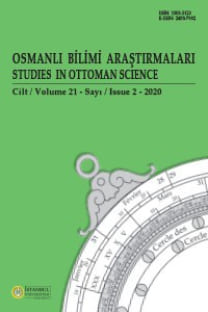İki Tahıl Ölçüsü Üzerine Sosyomatematik Notlar: Şebinkarahisar Kilesi ve Gödük
The kile of Şebinkarahisar and gödük are two units of capacity that are still used in northern Anatolia. Gödük is onesixteenth of the kile of Şebinkarahisar. A gödük of wheat weighs approximately 18 kilograms and one kile equals 288 kilograms. One gödük (18 kg) of grains are used to sow 1 dönüm (approximately 9401000 m²) of field and one kile (288 kg) of grains are used for sowing 16 dönüms. Thus kile is used as a land measure as well. A kile equals 4 çeriks, 16 gödüks, 32 yarıms. One gödük equals 2 yarıms or 4 mucurs or 8 çiniks. Gödük, a cylindrical measure of capacity, is especially in use in the provinces of Sivas (districts of Gölova, Akıncılar, Suşehri, Koyulhisar) and Giresun (districts of Şebinkarahisar, Alucra).A mathematical agreement for the rationalization of economical life emerges necessarily within sociological structures having agriculturally intensive production. The concept of sociomathematics implies the concretization of human mind and culture with mathematics in social life. Metric system is a consensus accepted universally whereas local measures of capacity for cereals are smallscale examples. Sexagesimal, duodenary and decimal systems based on the numbers 60, 12 and 10 are widespread. The presence of a sedecimal (hexadecimal, 16based) system for measures in Anatolia is of interest from the historical and sociological point of view. Although examples are already known up to now, this study aims to recall the issue by giving a local example.The use of different weight and measures in different part of the Ottoman Empire and their changing values with time is a wellknown issue in the studies of Ottoman agricultural history. This study can be regarded as an attempt to exemplify the links between ethnography, sociology and history by presenting two measures (kile and gödük) that were and are still locally used in Turkey.
Sociomathematical notes on two measures for cereals: kile of Şebinkarahisar and gödük
The kile of Şebinkarahisar and gödük are two units of capacity that are still used in northern Anatolia. Gödük is onesixteenth of the kile of Şebinkarahisar. A gödük of wheat weighs approximately 18 kilograms and one kile equals 288 kilograms. One gödük (18 kg) of grains are used to sow 1 dönüm (approximately 9401000 m²) of field and one kile (288 kg) of grains are used for sowing 16 dönüms. Thus kile is used as a land measure as well. A kile equals 4 çeriks, 16 gödüks, 32 yarıms. One gödük equals 2 yarıms or 4 mucurs or 8 çiniks. Gödük, a cylindrical measure of capacity, is especially in use in the provinces of Sivas (districts of Gölova, Akıncılar, Suşehri, Koyulhisar) and Giresun (districts of Şebinkarahisar, Alucra).A mathematical agreement for the rationalization of economical life emerges necessarily within sociological structures having agriculturally intensive production. The concept of sociomathematics implies the concretization of human mind and culture with mathematics in social life. Metric system is a consensus accepted universally whereas local measures of capacity for cereals are smallscale examples. Sexagesimal, duodenary and decimal systems based on the numbers 60, 12 and 10 are widespread. The presence of a sedecimal (hexadecimal, 16based) system for measures in Anatolia is of interest from the historical and sociological point of view. Although examples are already known up to now, this study aims to recall the issue by giving a local example.The use of different weight and measures in different part of the Ottoman Empire and their changing values with time is a wellknown issue in the studies of Ottoman agricultural history. This study can be regarded as an attempt to exemplify the links between ethnography, sociology and history by presenting two measures (kile and gödük) that were and are still locally used in Turkey.
